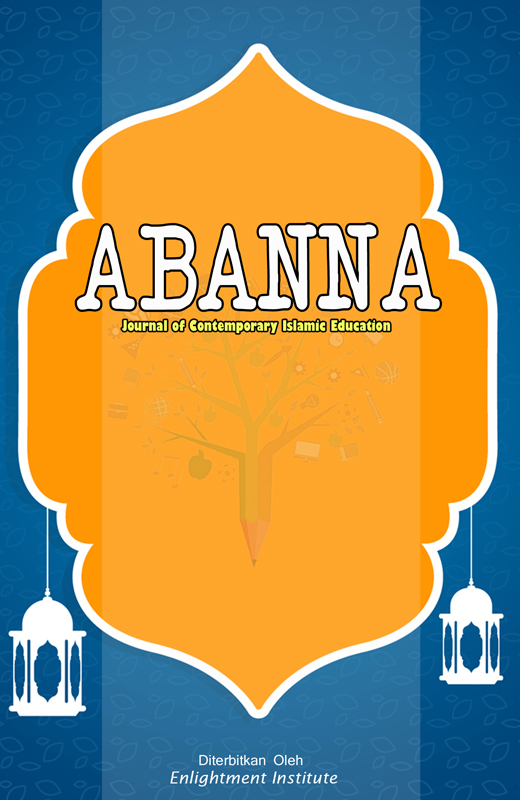INSTITUSI PENDIDIKAN DAN PENGEMBANGAN KARAKTER BANGSA
Main Article Content
Abstract
Educational institutions are official institutions that play an important role in passing on knowledge, culture and religion as well as being the main institutions that hold responsibility for the formation and development of the character of the nation's generations. Educational institutions have long been known by the world's population as institutions that inherit values and knowledge so that generations are able to take responsibility for their every action. Education is the learning of knowledge, skills, and habits of a group of people that is transferred from one generation to the next. In Law no. 20 of 2003 has stated that education is a conscious and planned effort to create a learning atmosphere and learning process so that students actively develop their potential to have religious spiritual strength, self-control, personality, intelligence, noble character, and the skills needed by themselves and society. , nation and state. The good civilization of a nation can be seen from the number of problems experienced by that nation, or it can be seen from the level of prosperity of its people. The younger generation is the party who most determines the condition of a nation in the future. A good and quality young generation can be created through the education process. Through education, we will create a generation that has great abilities in overcoming various problems of a nation.
Downloads
Article Details
References
Abdullah, T. (1983). Agama dan perubahan sosial, Rajawali.
Ahmad, L. H. (2014). Keberkesanan kurikulum pendidikan Islam dalam pembentukan sahsiah Muslim: kajian terhadap pelajar di Politeknik Pantai Timur/Lukman Hakimi bin Ahmad, University of Malaya.
Ahmad, L. H. (2014). "Persepsi Pelajar terhadap Kurikulum Pendidikan Islam Politeknik dalam Pembentukan Sahsiah Muslim (Students’ Perception Towards the Islamic Education Curriculum at Polytechnics in the Formation of the Muslim Character)." Malaysian Journal of Education 39(2)
Al-Ghazali (1336). Misykatul anwar. Al Mishry, Maktabak Al-Mulukiyyah
Ball, S. (2004). "The RoutledgeFalmer reader in sociology of education."
Bills, D. B. (2004). The sociology of education and work, Blackwell Oxford.
Burgess, R. G. (1986). Sociology, Education and Schools: An Introduction to the Sociology of Education, ERIC.
Depdiknas, P. B. (2008). "Pusat Bahasa Departemen Pendidikan Nasional." Kamus Bahasa Indonesia. Jakarta.
Dewey, J. (1994). The moral writings of John Dewey, Pyr Books.
Greenberg, M. T., et al. (2003). "Enhancing school-based prevention and youth development through coordinated social, emotional, and academic learning." American psychologist 58(6-7): 466.
Hallinan, M. T. (2006). Handbook of the Sociology of Education, Springer Science & Business Media.
Hashim, S., et al. (2007). Teori personaliti dari perspektif Islam, timur & barat, PTS Professional.
Huitt, W. (2004). "Moral and character development." Educational psychology interactive: 1-10.
Idris, S. (1998). Pendidikan di Aceh, Banda Aceh: Majelis Pendidikan Daerah.
Jones, E. N., et al. (1999). "Character Education & Teacher Education: How Are Prospective Teachers Being Prepared to Foster Good Character in Students?" Action in Teacher Education 20(4)
Kirschenbaum, H. (2000). "From values clarification to character education: A personal journey." The Journal of Humanistic Counseling 39(1): 4-20.
Ma’luf, L. (1986). "al-munjid fi al-lughah wa al-a’lam." Beirut, Libanon: Darul Masyriq, cet 28.
Miskawaih, A., Ibn,Muhammad,Suhail al-Uṯman (1981). Min Tahḏīb al-aḫlaq li-Miskawaih. Mesir, Mansurat Wizarat aṯ-Ṯaqafa wa-'l-Irsad al-Qaumi.
Muthahhari, M. (2011). Bedah Tuntas Fitrah: Mengenal Jati Diri, Hakikat dan Potensi Kita, Jakarta: Citra.
Muthmainnah, I. (2014). Designing the curriculum of Kitab Kuning (Arabic Script) at Pondok Pesantren Salafiyah in South Kalimantan, Universiti Utara Malaysia.
Nuraini, N. (2014). "Potret Islam Tradisional “Dayah dan Ulama di Aceh Abad Ke-20” dalam Perspektif Sejarah." Jurnal MUDARRISUNA: Media Kajian Pendidikan Agama Islam 4(2)
Sahabuddin, H. Y., Rohizani (2007). Personaliti Dari Perspektif Islam, Timur & Barat. Batu Caves Selangor, PTS Professional Publishing Sdn.Bhd.
Said, M. (1981). "Aceh Sepanjang Abad Jilid I." Medan: PT Percetakan dan Penerbitan Waspada Medan.
Turner, B. S. (2006). The Cambridge Dictionary of Sociology, Cambridge niversity press

